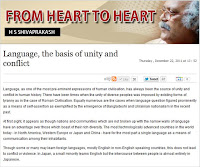[MLE] NCERT Evaluation Report on MLE Project Orissa

Dear Multilingual Education Friends, The evaluation report by NCERT's Department of Elementary Education on the Orissa MultiLingual Education projects under SSA/OPEPA is now available on-line at the TCF-SSA website *. These are some highlights from the summary: Overall, results suggested that children in MLE schools (treatment group) received significantly higher achievement scores than children in non-MLE schools (comparison group). However, scores for several Tribal languages showed that students of non-MLE schools did as well or even slightly better than students of MLE

